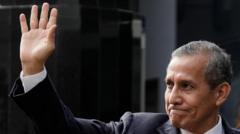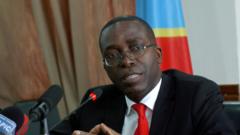Ollanta Humala's conviction marks a significant moment in Peru’s ongoing battle against political corruption
Ollanta Humala Sentenced to 15 Years for Money Laundering in Peru

Ollanta Humala Sentenced to 15 Years for Money Laundering in Peru
Former president's conviction follows a lengthy trial involving illegal campaign financing
In a landmark ruling, Peru's former president Ollanta Humala has been convicted of money laundering and sentenced to 15 years in prison. The verdict, delivered by a Lima court, found that he received illicit funds from the notorious Brazilian construction firm Odebrecht to support his election campaigns in 2006 and 2011. Alongside him, his wife, Nadine Heredia, co-founder of the Nationalist Party, has also been sentenced to 15 years on similar charges.
After a grueling trial that extended over three years, the court came to a conclusion Tuesday. Humala was present during the announcement, while Heredia attended remotely via video link. The prosecution initially sought more severe sentences, proposing a 20-year term for Humala and 26.5 years for Heredia, but the court ultimately opted for lesser penalties.
Ollanta Humala, a former army officer notable for his resistance against the Maoist Shining Path insurgency, first emerged in the political landscape through a failed military uprising against then-president Alberto Fujimori in 2000. His political journey began with a presidential campaign in 2006, where he faced criticism for alleged ties to Venezuelan leader Hugo Chávez, accused of covertly funding his campaign.
In 2011, Humala adopted a more centrist approach, distancing himself from Chávez’s policies and finding success against his rival, Keiko Fujimori. Yet, the initial popularity of his presidency waned due to violent social unrest and deteriorating congressional support. Post-2016, following his administration, legal scrutiny intensified when Odebrecht admitted to extensive bribery schemes in Latin America, implicating numerous politicians, including Humala and Heredia.
Despite their denial of wrongdoing, the couple's legal troubles escalated with their pre-trial detention ordered a year after they left office. Although they were released after a year, the investigation persisted, ultimately culminating in today's significant verdict highlighting the persistent challenge of political corruption in Peru.
After a grueling trial that extended over three years, the court came to a conclusion Tuesday. Humala was present during the announcement, while Heredia attended remotely via video link. The prosecution initially sought more severe sentences, proposing a 20-year term for Humala and 26.5 years for Heredia, but the court ultimately opted for lesser penalties.
Ollanta Humala, a former army officer notable for his resistance against the Maoist Shining Path insurgency, first emerged in the political landscape through a failed military uprising against then-president Alberto Fujimori in 2000. His political journey began with a presidential campaign in 2006, where he faced criticism for alleged ties to Venezuelan leader Hugo Chávez, accused of covertly funding his campaign.
In 2011, Humala adopted a more centrist approach, distancing himself from Chávez’s policies and finding success against his rival, Keiko Fujimori. Yet, the initial popularity of his presidency waned due to violent social unrest and deteriorating congressional support. Post-2016, following his administration, legal scrutiny intensified when Odebrecht admitted to extensive bribery schemes in Latin America, implicating numerous politicians, including Humala and Heredia.
Despite their denial of wrongdoing, the couple's legal troubles escalated with their pre-trial detention ordered a year after they left office. Although they were released after a year, the investigation persisted, ultimately culminating in today's significant verdict highlighting the persistent challenge of political corruption in Peru.



















